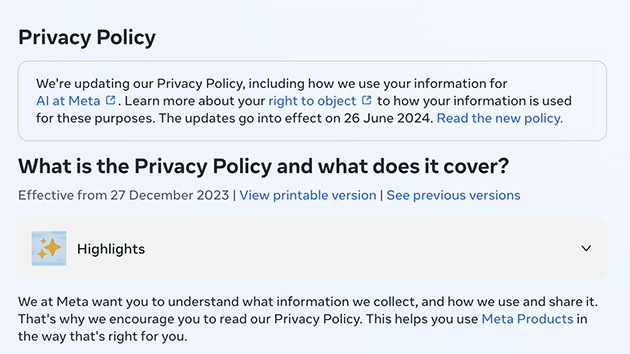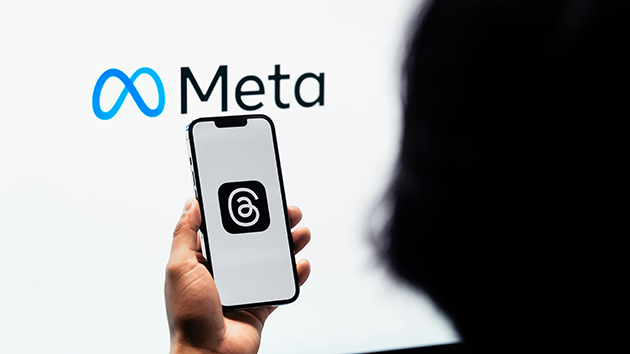5 June 2024| St Albans, UK [Vanesa Pizzuto]
If you use Instagram or Facebook, this news story might make you raise an eyebrow. Meta— the media giant that owns Facebook, Instagram, Threads, WhatsApp, and a bunch of other services—has updated its policy. From 26 June, it will start using your information to train its AI models. Yes, you read that right! ‘What kind of information?’ you ask. Anything you post (including pictures and captions) and what others post about you! Excluded are your private messages on Facebook or Instagram.
It seems only Europeans can escape this massive data harvesting, thanks to the General Data Protection Regulation, aka GDPR. (Mental note: never grumble about those GDPR consent forms again!). Because of GDPR, Meta has to inform users about these changes and, more importantly, give them the right to object.
So, they’re required to inform us. But are they making it easy for us to opt out? Not really!
How to Opt Out
Opting out is a convoluted process that seems designed to deter anyone who isn’t doggedly determined. For instance, you might spot a notification on your Instagram account. If you do, resist the urge to tap that big blue ‘CLOSE’ button and instead hunt for the tiny blue link that says, ‘right to object’.
But what if you’re like me and don’t recall seeing any such notification? Don’t worry! I will guide you step-by-step. Here’s what you’ll need: 1. Your country of residence, 2. An email address (Meta will send you an authentication code, without which they will consider your submission incomplete!), and 3. A reason why you don’t want Meta to use your data.

That third requirement made me laugh! (For the record, you should be able to opt-out without any explanation). However, feel free to use this handy template: “Because I am a UK/EU resident, my data is protected by the General Data Protection Regulation. This gives me the right to opt out of Meta using my content. Thus, I do not give you consent to use my content to train AI models.”
Ready to opt out? Here’s how:
Facebook:
- Log into your account.
- Go to the Privacy Centre.
- Scroll down and select “What is the Privacy Policy and what does it cover?”.
- Click on the tiny “right to object” link (top of the page, right side).
- Fill out the form (here is where you copy/paste the template answer).
- Enter the authentication code and submit.
Instagram:
- Log into your account.
- Head to the Privacy Centre.
- Click on the tiny link: ‘right to object’.
- Fill out the form (here is where you copy/paste the template answer).
- Enter the authentication code and submit.
Even after all that, Meta will review your request and send you a reply (I am still waiting for mine!).

What’s the Big Deal?
To get smarter, AI models need to consume vast amounts of data (picture here an elephant or a blue whale hoovering everything in sight). The tricky part is finding tons of non-copyrighted, non-private data to feed these hungry AI models. The “solution,” as highlighted by the Getty Images v Stability AI case, has pitted artists against AI companies.
To give you a simple example: say you are a painter, or a writer using Instagram to promote and sell your work. The last thing you need is Meta using your work to train its AI to replicate your creations, compete with you and do all of this without paying you a penny for copyrights.
Author Joanna Maciejewska brilliantly summarised it in a post on X (formerly Twitter) that went viral: “I want AI to do my laundry and dishes so that I can do art and writing, not for AI to do my art and writing so that I can do my laundry and dishes.”
But it’s not just creators who are at risk. Scammers are getting crafty with AI, creating deepfakes and cloning voices for scam calls. Just recently, one of my friends used old recordings from a radio show I hosted to clone my voice. It was all in good fun, but it made me realise how easily it could be done for malicious purposes. Protecting the privacy of our data (and that of young and vulnerable family members) is crucial. While policies and laws crawl at a snail’s pace compared to the rapid advancements of AI, we must stay vigilant and exercise our rights. In an age where personal information is gold, safeguarding our privacy is more important than ever.
[Photos: Unsplash, Glen Carrie / Pexels, Julio Lopez].



